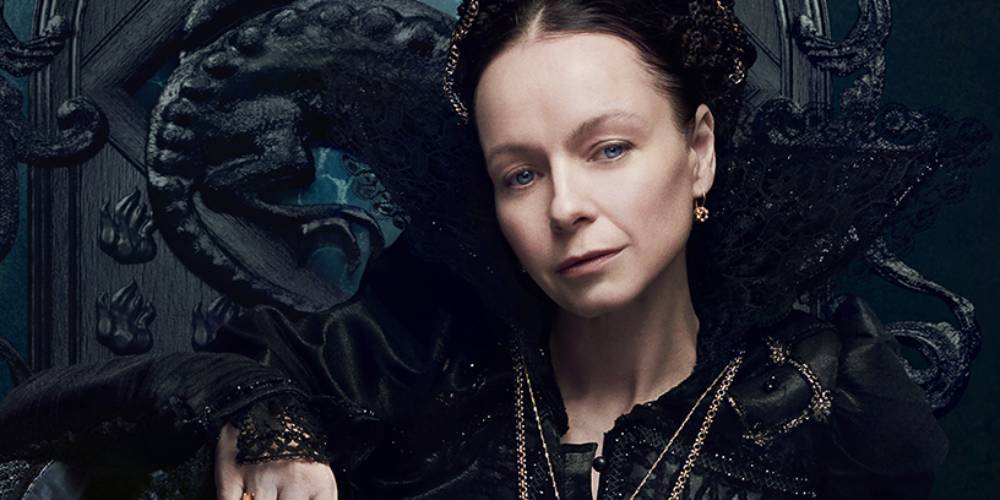When a new period drama drops, I always wonder, what kind is this one going to be? Are we going to get a lavishly costumed, escapist soap opera? Will it be dark and gritty, full of racism, misogyny and brutality? Will it be painstakingly immersive, or sardonic and winkingly anachronistic?
Read: House of the Dragon is too violent – I can’t stomach it
Stan is Australia’s home for the pulpy, bodice-ripping period dramas of US network Starz, many of which have focused on the English royals – most recently, the engrossing Becoming Elizabeth. Writer and executive producer Justin Haythe (Revolutionary Road) created eight-part series The Serpent Queen, based on Leonie Frieda’s 2004 biography Catherine de Medici: Renaissance Queen of France. And tonally, it tries a little bit of everything.
A gnarly electric guitar wails as the camera swoops across a flagstone floor, alighting on snakes slithering from beneath a woman’s black gown. Pan up to the calm yet penetrating stare of Samantha Morton. Yep, that’s Catherine de’ Medici, dowager queen of France – and I bet you’re wondering how she got where she is now!
Royal dramas and you
Royal sentimentality is salting airwaves and saturating screens right now, which offers an opportunity to consider what kinds of royal fantasies we plebs indulge. Sometimes we like to think of royal families as corporations: we love to watch rival scions and courtiers ambitiously jostling for power. It’s a way of vicariously satisfying our own cravings for agency.
Or sometimes we prefer a revisionist critique of monarchy in which royal families are stultifying, even cruel institutions. We like to console ourselves that those staggeringly wealthy, privileged, are really miserable pawns, manipulated by others. At least we’re free to live as we choose, right?
There’s even a strand of class-melting fantasy which takes us into the inner sanctum, where kings and queens, princes and princesses are just regular people with regular struggles. This is the ongoing conceit of Peter Morgan’s work, beginning with The Queen, The Audience, and continuing with The Crown, which is becoming an uncanny simulation as its plotlines lumber closer and closer to the present day.
Read: Royal legacy: 10 films about Queen Elizabeth II & the monarchy (that you should watch)
Catherine de’ Medici’s history has mostly been written by her enemies, who cast her as a witch, poisoner and torturer; and one refreshing thing about The Serpent Queen is that it doesn’t try to argue Catherine was misunderstood. Yeah, she was a villain – but to survive, she had to become one. To quote the tagline: what would you have done differently?
Breaking history’s fourth wall
The series uncoils in flashback around a framing device set in 1589, when Catherine is planning to marry her son to Mary, Queen of Scots (Antonia Clarke). Rahima (Sennia Nanua), a maidservant known only as ‘It’ to her colleagues, is sent to bring food to her mistress – a task they all dread.
Initially, Rahima’s submissive, cautious behaviour annoys Catherine; but in one of those corny ‘you remind me of my younger self’ plot devices, Catherine nonetheless feels drawn to narrate her own life’s trajectory. Rahima is a good listener – and shrewder than she seems. But is she being drawn into Catherine’s sinuous coils in another of her slippery plots?
Read: Dangerous Liaisons on Stan: trailer
Back in the 1530s, 14-year-old Catherine (now played by Liv Hill) is an orphan kidnapped from the convent where she’s lived since her wealthy parents died of syphilis, followed suspiciously soon afterwards by her grandmother. Her creepy uncle, Pope Clement VII (Charles Dance), saves her from Florence’s war-torn streets to use her as a political bargaining chip. Catherine is to be married to the French Prince Henri (Will Heath) for her family money and her ability to pump out heirs.
Hill’s deadpan performance energises these early scenes: it’s easy to see how her whey-faced gaze will harden and crystallise into Morton’s quietly terrifying presence. Catherine makes the mistake of falling for her new husband and trusting her French cousin, Diane de Poitiers (Ludivine Sagnier). She quickly learns the folly of emotions when she realises Henri’s erotic fixation on Diane, a woman twice his age.
But Hill’s sardonic acting style also suits the satirical tone of this flashback device, which seems to have another Stan series in its sights – the deliberately anachronistic The Great. When I reviewed that show, I likened Tony McNamara’s approach to a screwball workplace comedy. While Haythe’s screenwriting is sometimes more heavy-handed, Catherine breaks the fourth wall here in a mockumentary way. And the director, Dickinson’s Stacie Passon, never lets us forget we’re watching a constructed story by an unreliable narrator.
Catherine’s native intelligence and cunning put her one step ahead of the pampered French courtiers, led by the buffoonish King Francis (Colm Meaney). I’ll be interested to see whether the series persists with its dark comedy as Hill ages into Morton. We know that with determination, ruthlessness and a touch of black magic, Catherine will rule France for 50 years – first as Henri II’s queen, and then as queen mother of Francis II, Charles IX and Henri III – by becoming feared rather than loved.
That Medici magic
There’s something faintly occult about the way Catherine tells her story. Even as a baby born to Europe’s wealthiest commoner family, she seems to have attracted bad luck – and possessed a kind of latent psychic power. Is it intelligence? Is it malice? Is it poison? Or is it black magic?
In a pivotal early moment, young Catherine meets magician-for-hire Cosimo Ruggeri (Enzo Cilenti) on the streets of Florence. He seems to glimpse her power – so she adds this disreputable stranger to her retinue to help her harness it. Cosimo is joined by short-statured, pugnacious Mathilde (Australian actor Kiruna Stamell), and a beautiful Moorish convert, Aabis (Amrita Acharia), whose appeal to men Catherine plans to study and emulate.
Morton’s casting hints at further witchiness; she’s always been magnetic and a little uncanny onscreen. Her characters feel intensely interior, with an undercurrent of ruthlessness. Viewers may know her best as the ‘precog’ in Minority Report, the religious extremist leader from Fantastic Beasts and Where to Find Them, or the shaven-headed mystic villain from late-season The Walking Dead.
Read: JK Rowling betrayed us but I’ll still watch Fantastic Beasts
But I last saw her as 18th-century brothel madam Margaret Wells in Harlots – which is also available on Stan. Like The Serpent Queen, this picaresque drama toyed with anachronistic trappings in its first season – lurid fluorescent colours; contemporary soundtracks – before settling in for something more traditional.
I wonder if The Serpent Queen, too, will settle into more conventional storytelling as Catherine becomes caught up in power struggles – at first with Diane, and then with French court families the Bourbons and Guises. But I’m hopeful that the magic will persist, as it’s easily the most original aspect of this series.
The Serpent Queen
- Creator: Justin Haythe
- Writer: Justin Haythe
- Producers: Nick O’Hagan, Brad Rohrer, Willa Whalen
- Executive Producers: Justin Haythe, Francis Lawrence, Erwin Stoff, Stacie Passon
- Directors: Stacie Passon, Ingrid Jungermann
The Serpent Queen is currently streaming on Stan – with new episodes every Sunday.
Actors:
Director:
Format: Movie
Country:
Release:





